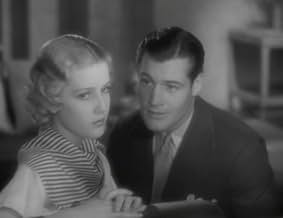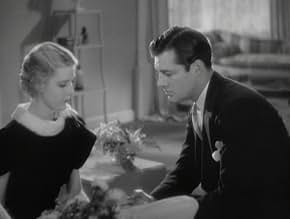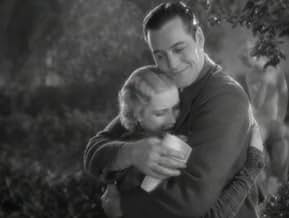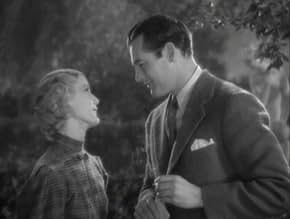अपनी भाषा में प्लॉट जोड़ेंAn American heiress marries a lord, and shocks London society.An American heiress marries a lord, and shocks London society.An American heiress marries a lord, and shocks London society.
- निर्देशक
- लेखक
- स्टार
- पुरस्कार
- कुल 1 जीत
Violet Kemble Cooper
- Duchess
- (as Violet Kemble-Cooper)
Virginia Howell
- Mrs. Saunders
- (काटे गए सीन)
Walter Walker
- Mr. Saunders
- (काटे गए सीन)
Finis Barton
- Diana - George's Mistress
- (बिना क्रेडिट के)
Bunny Beatty
- Lady Helen
- (बिना क्रेडिट के)
May Beatty
- Duchess of Hightower
- (बिना क्रेडिट के)
Tyrell Davis
- Ernest
- (बिना क्रेडिट के)
Bradley Metcalfe
- Little Boy
- (बिना क्रेडिट के)
फ़ीचर्ड समीक्षाएं
American hardware heiress Constance Bennett marries English lord Alan Mowbray. Then she overhears him remarking to his mistress he only married her for her money. She's heartbroken, but becomes a pillar of British society. When her sister, Anita Louise, comes to visit, Miss Bennett engineers a breakup with Miss Louise's American fiance, and an engagement to a British nobleman.
This definitely pre-code movie is based on a W. Somerset Maugham play, with lots of snide business and the sort of arch comments that passed for wit in a post-Oscar Wilde theater. Director George Cukor has mediocre success in convincing his cast that this is no longer being performed on the boards. The result is that the Americans are rather quiet, while the British are over the top... which may have been a deliberate choice, given that at this time, British movies seemed to have a lot of appearances by Finlay Currie as an American (invariably named 'Hiram' or some such), flattening his vowels with a sledge hammer and being obnoxious about money. Minor Watson is outstanding as an admirer of Miss Bennett, and Tyrell Davis is flamboyant as he teaches Violet Kemble Cooper to dance.
This definitely pre-code movie is based on a W. Somerset Maugham play, with lots of snide business and the sort of arch comments that passed for wit in a post-Oscar Wilde theater. Director George Cukor has mediocre success in convincing his cast that this is no longer being performed on the boards. The result is that the Americans are rather quiet, while the British are over the top... which may have been a deliberate choice, given that at this time, British movies seemed to have a lot of appearances by Finlay Currie as an American (invariably named 'Hiram' or some such), flattening his vowels with a sledge hammer and being obnoxious about money. Minor Watson is outstanding as an admirer of Miss Bennett, and Tyrell Davis is flamboyant as he teaches Violet Kemble Cooper to dance.
This movie haunts me in a way and fills me with questions. Why did Selznick make this screen version of a 1917 Maugham play right in the middle of the Great Depression in America? I wonder what was on his mind -- to make people angry enough to bring their friends for another look? To let them scoff at the foibles of the impossibly idle rich? This movie primarily is about American expats who've found a place among a jaded British aristocracy (which, at the time of Maugham's stage play, were, with the rest of England, at the height of a bloody world war that would cost Britain almost an entire generation of its young men). But this film version was brought to the screen in 1933, at the height of a crushing Depression that left so many millions jobless and homeless and lucky to have the price of a night at the movies. Contrast that with the sly comic turnings of a very young Gilbert Roland as the Chilean idler Pepi, whose pouty side-glances as he manipulates his very rich and titled benefactress were elegantly applied and flawlessly aimed, no doubt, at enraging most any Depression-oppressed American of the day. I'm sure Roland (no idler himself) and Cukor had a lot of fun filming Pepi. I loved the steady Grant Mitchell, elegantly playing a happy snob who unashamedly admits that he'd come to England from Ohio, and has "lost any trace of an American accent." No apologies from his character, who lends the picture a decorum and good-humored tolerance, all in the cause of maintaining these high-blown dodgy "friendships," deftly working to keep things on a happy note, despite bothersome indiscretions. Others have written here of the remarkable performance of Violet Kemble Cooper as the Duchess, and I heartily agree. And what a happy surprise was the very late entrance in the picture of Tyrell Davis (one of the famous tailors from Wellman's "The Public Enemy" two years earlier) as the unabashedly delightful pouffe Ernest, brought in by Bennett's character to salvage a nearly wrecked country weekend. Ernest was summoned hastily from a busy Sunday schedule in London, still attired in his city-best, flawlessly coiffed, with dark heart-shaped lip rouge, more eye shadow than Bennett, and powdered like a pastry. He carried his look as proudly, happily and effortlessly as did the elegant Bennett in her timelessly smashing Hattie Carnegie gowns. Across the Channel, he'd have been exterminated by the Nazis, but in his place among a protective British aristocracy, Ernest was obviously a most happy man, allowed to act out himself completely and taking his place as a favorite among the ladies. I'm astonished that Davis, whose Ernest hilariously capped the picture and who uttered its naughty closing line, was not credited for this fresh and pleasing (or shocking) performance. Have you ever seen such a face in the movies? Or anywhere else? Such a happy individualist in a society that outlawed some of his assumed after-hours behavior. Without the protection of the aristocracy, Ernest, like Wilde, likely would have spent part of his life in prison. This picture contains some dated stage business and moves a bit too slowly for us today, but I'm so happy that it survives. I still wonder, though, what was the aim of making this movie at this time in the American experience? Hughes and Selznick wanted and expected an audience and a profit, after all. Was a Maugham play burning a hole in their pockets? Were generous eyes-full of Constance Bennett in clingy satin gowns enough to draw 'em in? I suspect there was a social aim here, but I'm not sure what it is.
Constance Bennett is a disillusioned socialite in "Our Betters," based on Somerset Maugham's play. Bennett plays a beautiful woman (in absolutely knockout gowns) who, on her wedding day, discovers that her husband has a mistress, a Charles-Diana-Camilla thing. Bennett's got the cash, and the girlfriend's poor. Constance, who plays Lady Pearl, throws herself into the London social scene, where nobody behaves. Her husband is always off with his girlfriend, and she has a lover who keeps her since her husband went through her money. And everyone else behaves the same way. The only thing that matters is knowing the right people, having money, getting invited to the right parties, and marrying titles. When Pearl's sister arrives from America, she's dazzled by the life and brushes off an old beau, played by Charles Starrett, who is the moral voice of the movie.
This was the world of Elliot Templeton in "The Razor's Edge" and it's visited here fully with a brittle humor but not a great deal of energy. Bennett is perfect in her role. There are some scenes between Violet Kemble, who plays Minnie, and her much younger gigolo boyfriend, Gilbert Roland, where he manipulates her, that are overly long but quite funny. The final scene, with the dancing Ernest, is the best in the film.
This was the world of Elliot Templeton in "The Razor's Edge" and it's visited here fully with a brittle humor but not a great deal of energy. Bennett is perfect in her role. There are some scenes between Violet Kemble, who plays Minnie, and her much younger gigolo boyfriend, Gilbert Roland, where he manipulates her, that are overly long but quite funny. The final scene, with the dancing Ernest, is the best in the film.
10hotangen
Here we have a comedy about 3 American heiresses who married into British aristocracy and how they coped with their loveless marriages. Of the 3, Pearl/Bennett has coped especially well, having made herself the leader of the Smart Set. But her success as a titled lady of leisure is a lot of hard work. While Maugham's story is passe today, as it may have been in 1933, still, it's very entertaining, loaded with laughs and chuckles. Bennett is superb. She is so much fun to watch as she gets herself into trouble and then, against the odds, gets herself out. Drawing-room comedy suits her and is the direction she should have continued to travel. Bennett would have been wonderful as Amanda in Coward's "Private Lives", but MGM's Thalberg owned the rights, and in 1931, while Bennett was playing suffering womanhood, Shearer played Amanda.
Gilbert Roland was cast as the gold digger and did very well in a role that others, including Bennett's frequent costar, Joel McCrea, would have found impossible to play. The Duchesse demonstrates that furs and a little tricorn hat produce the illusion of beauty, if not youth.
Ernest, necessary to the plot, makes a surprise appearance at the end of the film, in a scene exactly as Maugham wrote it. However, while Maugham's stage directions describe Ernest as "overwhelmingly gentlemanly . . . speaks in mincing tones" it does not say that his face was a smear of eye shadow and lipstick. What possessed Cukor anyway? Ernest is a likable character and doesn't need garish makeup to deliver the very funny lines Maugham wrote for him.
The opening 2 scenes with husband George were not in the play. Apparently they were added to provide motivation as to why Pearl is the way she is and to make Pearl/Bennett sympathetic to audiences. Was this ruse successful? Variety's reviewer wrote, "Miss Bennett goes wicked early and stays that way to the finish. That she shows no sign of repenting or changing her ways will be difficult to justify with many of her best customers." Bennett's box-office popularity was slipping away. She had to escape the baby formula that made her a Star and change her image in order to attract new fans without losing her old fans. This was a difficult problem which Our Betters did not solve.
This film will not get boring with repeat viewings. In spite of its imperfections, I intend to watch it repeatedly. After 82 years, the comedy and Bennett are still bright. Therefore, it rates a 10.
Gilbert Roland was cast as the gold digger and did very well in a role that others, including Bennett's frequent costar, Joel McCrea, would have found impossible to play. The Duchesse demonstrates that furs and a little tricorn hat produce the illusion of beauty, if not youth.
Ernest, necessary to the plot, makes a surprise appearance at the end of the film, in a scene exactly as Maugham wrote it. However, while Maugham's stage directions describe Ernest as "overwhelmingly gentlemanly . . . speaks in mincing tones" it does not say that his face was a smear of eye shadow and lipstick. What possessed Cukor anyway? Ernest is a likable character and doesn't need garish makeup to deliver the very funny lines Maugham wrote for him.
The opening 2 scenes with husband George were not in the play. Apparently they were added to provide motivation as to why Pearl is the way she is and to make Pearl/Bennett sympathetic to audiences. Was this ruse successful? Variety's reviewer wrote, "Miss Bennett goes wicked early and stays that way to the finish. That she shows no sign of repenting or changing her ways will be difficult to justify with many of her best customers." Bennett's box-office popularity was slipping away. She had to escape the baby formula that made her a Star and change her image in order to attract new fans without losing her old fans. This was a difficult problem which Our Betters did not solve.
This film will not get boring with repeat viewings. In spite of its imperfections, I intend to watch it repeatedly. After 82 years, the comedy and Bennett are still bright. Therefore, it rates a 10.
Constance Bennett plays Pearl, an heiress bride who, on her wedding day immediately after the ceremony, overhears her new husband tell his lover that he married Pearl only for her money as he and his lover are penniless. However, he does have a British title, and Constance goes to live in Britain with him, with their lavish lifestyle at first financed by her money. When that runs out, she has a lover who supplies her with cash.
I generally watch these old films to escape the cynicism of today's world, and this film fails in that respect. The entire cast behaves in a despicable and inhuman manner like something out of ancient Rome, with the exception of Pearl's young sister Bessie, who is a wide-eyed innocent about to make the same mistake as Pearl did when she married her faithless husband. We all figure that Pearl behaving like a manipulative pleasure-addicted ice queen is rooted in her husband's betrayal, but nothing is said about motivation at all until the end of the film. George Cukor generally did a great job in these "women's films", especially if Katharine Hepburn was starring. But then Kate was such an excellent actress that she could get her motivation across without the use of explicit dialogue. Constance Bennett usually could do so too, so why things don't pan out here theatrically I have no idea.
As an aside, it is interesting that Gilbert Roland and Constance Bennett play lovers in this and one other film from 1933 - "After Tonight" - yet don't marry until eight years later. I wonder if there's a story there?
I generally watch these old films to escape the cynicism of today's world, and this film fails in that respect. The entire cast behaves in a despicable and inhuman manner like something out of ancient Rome, with the exception of Pearl's young sister Bessie, who is a wide-eyed innocent about to make the same mistake as Pearl did when she married her faithless husband. We all figure that Pearl behaving like a manipulative pleasure-addicted ice queen is rooted in her husband's betrayal, but nothing is said about motivation at all until the end of the film. George Cukor generally did a great job in these "women's films", especially if Katharine Hepburn was starring. But then Kate was such an excellent actress that she could get her motivation across without the use of explicit dialogue. Constance Bennett usually could do so too, so why things don't pan out here theatrically I have no idea.
As an aside, it is interesting that Gilbert Roland and Constance Bennett play lovers in this and one other film from 1933 - "After Tonight" - yet don't marry until eight years later. I wonder if there's a story there?
क्या आपको पता है
- ट्रिवियाElsa Maxwell was brought in as technical advisor for this film because of her vast experience in hosting events for royalty and high society. She also assisted Hattie Carnegie in the designs for the evening gowns worn by the principle actresses.
- गूफ़Although Bessie is supposed to be from New York, Anita Louise plays her with an affected British accent.
A person's accent is are not "cast in concrete". Accents change due to a change in environment or because a person is trying to blend in (or even acting). Regardless, a questionable accent certainly wouldn't be considered a "Plot hole".
- भाव
[last lines]
Minnie, Duchess of Sourae: You know, you're very naughty sometimes, Pearl, but you have a good heart and I can't help being fond of you.
Lady Pearl Saunders Grayston: Minnie!
Minnie, Duchess of Sourae: Pearl!
[they embrace]
Ernest: Ah! What an exquisite spectacle! Two ladies of title, kissing one another!
- कनेक्शनFeatured in The Celluloid Closet (1995)
- साउंडट्रैकThe Wedding March
(1843) (uncredited)
from "A Midsummer Night's Dream, Op.61"
Written by Felix Mendelssohn
Played by an offscreen organ during the wedding
टॉप पसंद
रेटिंग देने के लिए साइन-इन करें और वैयक्तिकृत सुझावों के लिए वॉचलिस्ट करें
विवरण
- चलने की अवधि1 घंटा 23 मिनट
- रंग
- पक्ष अनुपात
- 1.37 : 1
इस पेज में योगदान दें
किसी बदलाव का सुझाव दें या अनुपलब्ध कॉन्टेंट जोड़ें




































